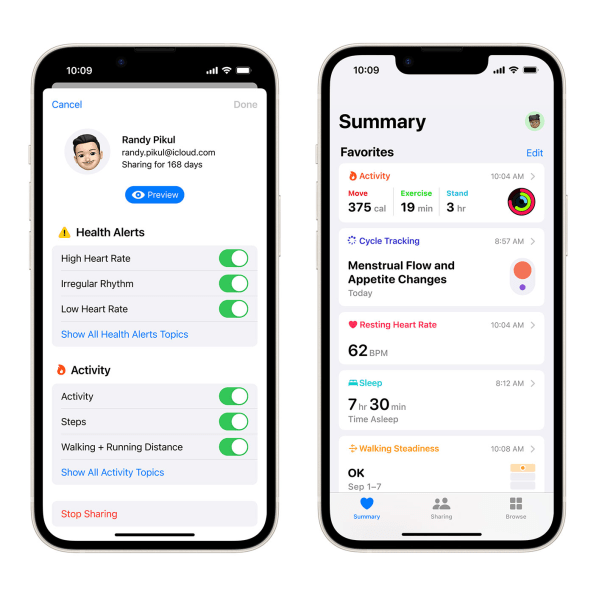When we think about digital privacy, it’s usually with regard to our personal communications, our location, and our financial data. Most of us probably haven’t given much thought to the privacy surrounding our health data: the procedures we undergo that hospitals keep track of, the conditions we are treated and billed for, the medications we are prescribed, and even our our heart rate and daily steps.
Over the last year or so, that’s started to change, especially in America. After the repeal of Roe v Wade, digital privacy advocates to civil rights groups have been concerned about the detrimental effects on women who may have their health data used in prosecutions against them in states where abortion is now illegal. These concerns are so strong that in April, the White House proposed federal rules that would limit the powers of law enforcement and state officials to obtain a woman’s medical records if she crossed state lines to have an abortion.
Today, Apple is launching a new campaign to help spread awareness around the importance of health data privacy—for everyone. It kicks off with a television and online ad that’s typical Apple: well-shot, informative, and clever. It features patients in a waiting room who have their private health conditions revealed to all by an invisible narrator, voiced by comedian Jane Lynch. The only person whose personal health condition is safe? The iPhone user using Apple’s Health app, of course.

For those not familiar with it, the Health app comes on every iPhone and can store nearly any kind of medical data that you choose to let it, from test results and medical history to your heart rate and menstrual period activity. The Health app also lets the user dole this data out to third-party health and fitness apps on their iPhone. The killer feature that Apple offers, if you are a privacy hawk, is that data stored in Apple’s Health app is end-to-end encrypted, so not even Apple can read it.
“We’re excited about this campaign because we’re hoping that we can educate people that this is what they should expect when it comes to privacy around their health information,” Sumbul Desai, Apple’s vice president of Health told me. It’s why, in addition to the ad campaign, Apple has also published a white paper that details the steps the company takes to protect a user’s health data.
To be sure, none of Apple’s privacy technologies listed in the white paper is brand new—most have existed long before iOS 16 was released last year. But many remain unique to Apple’s health ecosystem. This includes capabilities like on-device processing, so your iPhone doesn’t have to send your health data to Apple to analyze and send back to you in accessible form. Instead, your iPhone privately analyzes your health data right on its own hardware.
Another feature the Health app offers is the ability to share just a selection of health data with someone—a friend, family member, or doctor—and not all of it. For example, you can choose to share your heart rate and movement data with your brother, but not your weight or period data. And if you ever want to cut off the recipient’s access to your health information, it’s as easy as a few taps.
But Apple maintaining good oversight of its own capabilities is one thing. What about third-party health and fitness apps on your iPhone? Apple’s HealthKit API lets third-party developers interface with the Health app and your health data, but the user maintains control over what health data each third party app gets. Plus, as a condition of using the HealthKit API, the developers are forbidden from selling your health data, even anonymized, to data brokers or advertisers.

“There’s nothing more sensitive than your health data,” says Desai. “We see how crucial [data privacy] is in the financial world. It’s just as important, if not more important, when it comes to your health data. And we believe that you should have complete transparency about where that data is going.”
This new campaign has the potential to do more than just boost Apple’s “privacy king” street cred. Even if you are not an Apple user, you usually pay attention to what the company does. And when Apple moves in one direction, other players in the industry tend to follow, begrudgingly or not. A good example of this is the App Store “nutrition” labels that Apple introduced in 2020. The labels forced developers who distributed their apps through Apple’s App Store to be transparent about the user data their app collects and how it uses that data. iPhone users loved the privacy transparency feature, and two years later, Google announced similar privacy labels for apps in its Play Store.
But the privacy of our health data will be even more important as our phones, watches, and other gadgets continue to add health tracking and data collecting abilities. Just this week Samsung announced its new smartphone screen that can check users’ stress levels, heart rate, and blood pressure when they place their fingertips on the display. It’s an awesome advancement in display technology. But once such screens are commonplace, how are smartphone manufacturers going to treat your readily accessible health data every time you touch your screen?
With Apple, we know. Hopefully, its health privacy initiatives will cause other players to move in the same direction.
(15)